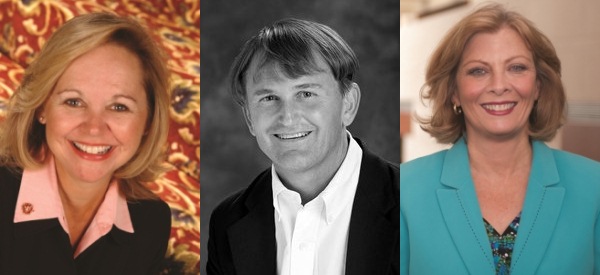CORRECTION APPENDED: Due to an editing error, the original story said Durham and Orange counties will vote on a half-cent sales tax for public transportation this fall. Orange County will not vote on the referendum, only Durham.
In preparation for the October elections, the Record interviewed the mayoral and city council candidates. The interviews will be part of a printed voter guide to be released in September. Using the responses from the interviews, the Record is doing a series featuring the mayoral candidates’ views on issues facing Raleigh.
Public transportation is a big issue for Raleigh and the city council. Fix the bus system, reduce congestion, pay for light rail, promote dense development around transit — those are all commonly heard throughout the city and around the city council table.
Each of the candidates — Nancy McFarlane, Billie Redmond and Randall Williams — gave their different views on public transportation.
Billie Redmond

Billie Redmond
Redmond said the public transportation system is “good,” but also needs improvements.
Redmond said it would take “all of the transit methods that we have here, because for the same reason we attract and keep people.”
“They want their car; they want to drive. They want to ride a bicycle, so they need bike lanes. They want to walk; they need the greenways. They want to ride public transportation because they don’t want to own a car or they want to live in a truly urban environment. I think we can do all those things,” Redmond said.
Redmond thinks public transportation “is a really difficult subject for a lot of people, and a lot of people support public transit because they want someone else to use it.”
“What they really want is for someone else to ride the bus or the train so they don’t have to wait in traffic in their car,” Redmond said.
Redmond takes a businesslike approach to the issue of light rail. Redmond believes light rail will help the city build its tax base, and that it “has a demonstrated track record of creating exponential private sector investment.”
“Ultimately, for us to really be a world-class city, we need to provide some levels of public transportation, but I think what we really ought to focus on today is what can we afford today, what can we preserve as an opportunity for the future, then how do we really stay focused on creating that private sector investment. And we know it will,” Redmond said.

Nancy McFarlane
Nancy McFarlane
McFarlane said public transportation would be most impacted by future population growth.
“If we double in population, we cannot possibly have twice as many cars on the road. No one will be able to get anywhere,” McFarlane said.
McFarlane felt that, with the demographics of the population shifting, having transportation, housing and work options are “critically important.”
McFarlane wants to see a combination of different transportation forms—buses, light and commuter rail.
McFarlane said she didn’t think the current “spoke” system for bus routes all running from downtown works well. “I tend to think of things developing as a spider web, and you not only have spokes, but you got to be able to have the rings too. Everything doesn’t need to come back down. You need to be able to get from here, to here, to here,” McFarlane said.
McFarlane also believes “a rail system is not going to work without a good bus system to support it.”
McFarlane said she wants to see a light rail system that serves Raleigh’s communities and helps future development.
“What’s going to be really important is that, as that develops, there are clear development patterns around transit stops that will allow for denser development. That allow people to have options, to be able to live, and work, and play, and not have to get in their car to do what they want to do,” McFarlane said.
McFarlane said light rail with areas for more development would create a “much higher tax base with a low cost of services.”
Randall Williams
For Williams, public transportation is about “regionalism.”

Randall Williams
“So, when we talk about public transportation, we’re talking about federal, state, county, and then regional authority, and then the city of Raleigh,” Williams said.
Williams said that the city is the “one entity” that “doesn’t probably have any role in paying for it.”
“If you look at everything out there, it’ll come out light rail, buses and referendums, it’s all on the county level,” Williams said.
Williams believes the city should “do its part as a regional entity” when it comes to public transportation, but that he is “sensitive” to the costs as well.
“You know the referendum is $900 million, of which $400 million is for buses, so certainly I think we can all agree on the $400 million for buses, regional buses. It’s the other part that I think is kind of out of our control, but clearly, all of the other entities put up the money for it,” Williams said, speaking of a proposed half-cent sales tax for public transit.
Durham County will vote on the tax this year, but Wake County Commissioners opted not to put the issue to voters this year.
As far as the rail system, Williams believes the answer is “more complex” than saying yes or no to it.
“I mean, I think you’ll talk to candidates who will go yay, nay. I mean, they’ll answer to that question very simply, they’ll go yes, I’m for light rail, commuter rail, every rail, I just think it’s more complex than that,” Williams said.
